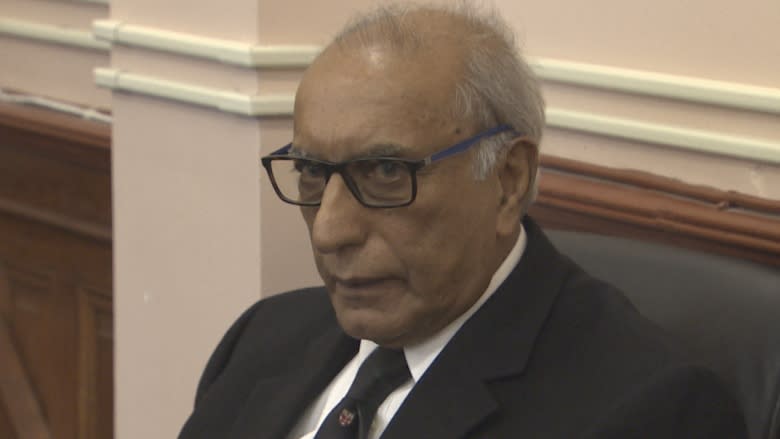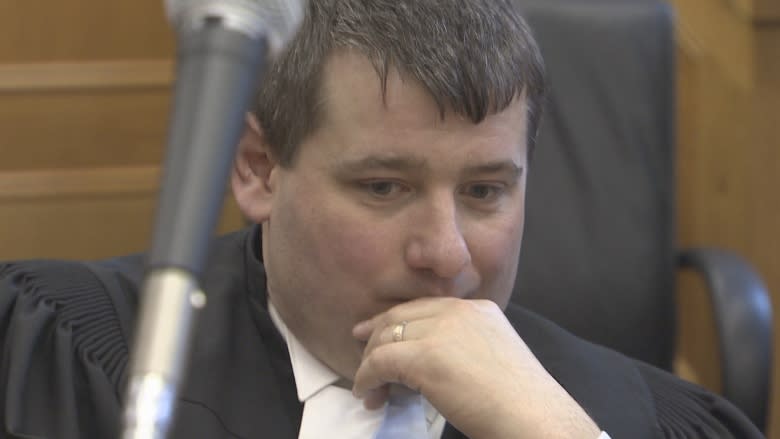Last witness wraps, jury prepares for final arguments in Anne Norris murder trial
The jury in the first-degree murder trial of Anne Norris is preparing for final arguments and instructions from the judge, as the last witness wrapped testimony Tuesday afternoon.
Norris, 30, has admitted to killing Marcel Reardon in May, 2016 by hitting him repeatedly in the head with a hammer, then placing his body under the steps of the St. John's apartment building where she lived and throwing the weapon into the harbour.
Her defence says she's not criminally responsible on account of mental disorder, while the Crown argues Norris knew the consequences of her actions and planned to kill Reardon.
The final witness, Dr. Gary Chaimowitz, is a professor of psychiatry at McMaster University and head of forensic psychiatry at St. Joseph's Healthcare in Hamilton, Ont.
He is the fifth psychiatrist who has done an assessment on Norris and given an opinion to the Supreme court of Newfoundland and Labrador during the course of the jury trial.
In Chaimowitz's report dated Feb. 19, he concluded that Norris understood the legal wrong of her actions, but did not equate the killing of Reardon with a moral wrong, calling it a "tragic case."
It was a conclusion based on a review of reports by other psychiatrists, including the last Crown witness, Dr. Jasbir Gill.
Gill, one of two forensic psychiatrists in Newfoundland and Labrador, said Norris may have been motivated by anger when she killed Reardon, but there could be other explanations, including that Norris was delusional at the time.
In her report, Gill said there could be a "reality-based motivation," relating to feelings of anger regarding sexual abuse — Norris had complained to police in 2011 that a basketball coach had sexually abused her from the ages of 13 to 17 — or feelings of abandonment, and intense difficulty coping with the trajectory of her life.
During cross-examination, the defence suggested that Gill had conducted her report in such a way as to support her suggestion that Norris could have borderline personality disorder.
A diagnosis of borderline personality disorder could change whether someone is found not criminally responsible, given the nature of that illness largely deals with mood disorders.
That was disputed by Gill, who said her report refers to previous diagnoses by other psychiatrists who referenced the possibility of a personality disorder, and her report is meant to present other options.
Woman with delusions, paranoia
When Chaimowitz took the stand, he said it was his conclusion that Norris has bipolar disorder with psychotic symptoms, the original diagnosis from 2012.
He said he would be inclined to agree with Dr. Nizar Ladha, the province's other forensic psychiatrist who was asked by the defence to do an assessment of Norris.
Ladha concluded that Norris was under a delusion the night she killed Reardon to the extent that she did not understand the consequences of her actions, and could therefore not be criminally responsible for her actions.
He diagnosed Norris with schizophrenia or schizoaffective disorder, which both Gill and Chaimowitz disagreed with.
Chaimowitz, who did not interview Norris, characterized her as a woman with delusions, who was paranoid and collected a variety of weapons at various periods in order to protect herself from what she claimed was ongoing assault.
In addition, Chaimowitz said the hospital records from Norris's committal to hospital on April 18, 2016, show fluctuating behaviours and moods. However, he said the records at that time show inconsistent diagnoses with previous treatments.
He said when Norris left the Waterford Hospital on May 6, 2016 — three days before she killed Reardon — she had no medication to treat her bipolar disorder and psychotic symptoms.
Not fearful behaviour
Earlier on Tuesday, Gill described the documents she reviewed to reach her conclusions, in lieu of an interview with Norris, since she declined to speak to Gill.
Included in those materials were statements from Kevin O'Brien and Jessica Peach, who were with Norris before and after she killed Reardon.
Gill said those statements didn't paint Norris as fearful of Reardon; Sullivan argued that O'Brien had only met Norris that day, and both O'Brien and Peach were intoxicated.
In Norris's interview with Ladha, she told him she was extremely fearful, worried Reardon would come into her apartment that night and kill her in her sleep.
Gill suggested that Norris's behaviour — going alone with Reardon to her apartment building — doesn't necessarily line up with someone who was fearful of Reardon.
In addition, Ladha described a steep decline in Norris — rotating between emergency shelters as opposed to staying with family; multiple delusions of being sexually assaulted in her sleep; waking up and feeling massive bumps on her head; being scared of everyone and everything.
Gill suggested in her report that there are other explanations for the decline — that it was part of a longer pattern, and could fit in with borderline personality disorder.
However, she also agreed with the possibility that she was bipolar with psychotic symptoms. Gill said she couldn't be more precise, given that she was unable to interview Norris.
Final arguments Thursday
Before jurors were dismissed Tuesday, Justice William Goodridge explained to them that they should return on Thursday at 9:30 a.m. with the expectation to hear final arguments from the Crown and defence.
Goodridge added that he will aim to start his instructions to the jury Thursday afternoon, at which time they will be sequestered to make their decision about whether Norris is criminally responsible for killing Reardon.
Jurors were told they will be "incommunicado" once that happens — no phones, TV or computers — until they reach their decision.
Follow along with the latest developments from inside the courtroom in our live blog.
















